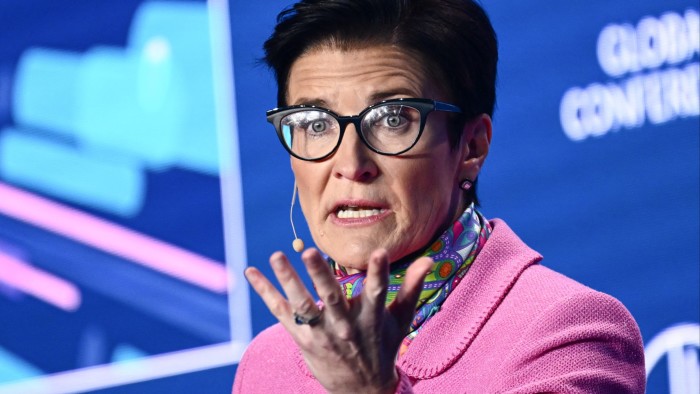Stay informed with free updates
Simply sign up to the US banks myFT Digest — delivered directly to your inbox.
JPMorgan Chase and Citigroup struck an upbeat tone on the strength of US consumers, underscoring how the world’s biggest economy has remained resilient despite the effects of Donald Trump’s tariffs.
The duo of Wall Street banks said there were signs that Americans’ financial footing was solid even as they contend with persistently elevated prices, high interest rates and broader economic uncertainty.
“The strength of the US economy, driven by the American entrepreneur and a healthy consumer, has certainly been exceeding expectations of late,” said Citi chief executive Jane Fraser.
Fraser still cautioned that Citi was not “dropping our guard as we begin the second half of the year”, noting “we expect to see goods prices to start ticking up over the summer as tariffs take effect, and we have seen pauses in [capital spending] and hiring amongst our client base”.
Jeremy Barnum, JPMorgan’s chief financial officer, echoed that sentiment, noting that the biggest US bank by assets continued “to struggle to see signs of weakness” in US consumer credit.
Wells Fargo CFO Michael Santomassimo similarly said on Tuesday that clients “have been able to manage through what’s happened so far pretty effectively”.

The broadly sanguine outlook comes after a volatile few months for financial markets. Trump’s April 2 announcement of sweeping tariffs on trading partners ignited a steep sell-off in US stocks and prompted worries over the potential the US would slip into a recession. Measures of consumer sentiment also darkened markedly.
Markets have steadied since then, with the S&P 500 reaching a new record high, as the US president has backed down from some of his most serious tariff threats. Still, a report on Tuesday on consumer prices showed tariffs were beginning to push inflation higher.
The tumult prompted by Trump’s policies has generally been a boon to banks’ Wall Street divisions, which have taken advantage of vigorous activity in markets, including stocks, bonds, currencies and commodities.
Fraser noted that “volatility is going to, I suspect, be a feature not a bug of the new world order and we will benefit from that”.
Citi’s trading revenues jumped 16 per cent in the second quarter from the same period in 2024 to $5.9bn, while JPMorgan’s rose 15 per cent to $8.9bn
The same market tumult had stunted investment banking but JPMorgan chief Jamie Dimon said the business had “gained momentum as market sentiment improved”.
Citi CFO Mark Mason said investment banking activity had recovered to where it was at the start of the quarter, before deals were put on hold in the wake of April’s tariff announcements.
Citi’s investment banking fees rose 13 per cent in the second quarter, while JPMorgan’s climbed 7 per cent.
Citi’s profits jumped almost 25 per cent as the bank posted revenue growth across its main divisions, including trading, investment banking and wealth management.
Return on tangible common equity — a closely watched profitability measure — rose to 8.7 per cent from 7.2 per cent in the same quarter in 2024. Fraser is seeking to boost the metric to 10-11 per cent by the end of next year.
Citi’s shares jumped 3 per cent on Tuesday, reaching their highest level since 2008.
JPMorgan’s net income fell to $15bn in the second quarter, down 17 per cent. Last year it benefited from a roughly $8bn one-off gain from its stake in Visa. The group’s shares were little changed on Tuesday.



